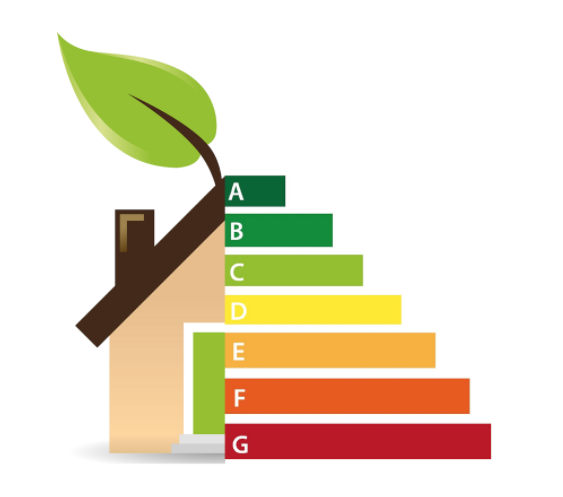How To Improve Your EPC Rating
According to a recent report,* 17% of landlords undertook a green refurbishment in the last year, and of those with four or more properties, 22% had improved the EPC of at least one of their properties ahead of tightening regulations.
The report also revealed that one in ten private renters would stay in their current property longer if their landlord made changes to the property which benefit the environment.
We've broken down the latest energy performance certificate regulations and outlined steps you can take to improve your property's EPC rating.
.jpg)
What is an Energy Performance Certificate?
An Energy Performance Certificate (EPC) is a report that provides an assessment of the energy efficiency of a property. It also provides recommendations on how you may improve it, if necessary.
The assessment results in a colour-coded grade that forms part of the report, ranging from A to G (see below). A is the most energy-efficient, G is the least energy-efficient. This rating gives potential renters or buyers a guideline for how much energy bills would cost for the property in question.
EPCs were introduced in 2008 to improve the basic energy efficiency standards in the UK.
However, in April 2020, the laws governing Energy Performance Certificate (EPC) ratings changed for UK rental properties. Under the new guidelines, landlords can receive a fine of up to £5,000 if their property has a low energy efficiency rating of F or G. In other words, landlords in England and Wales need to have an EPC rating of E or above.
Despite some competitive advantages afforded to landlords who shift towards greener models for their rentals, many landlords cannot afford the high costs.

Civil penalties for non-compliance
As of the 1st April 2020, any landlord who rents out a dwelling with an EPC rating of F or G can expect a civil penalty for non-compliance with the new Domestic Minimum Energy Efficiency Standard (MEES) government regulations. The resulting fine can be as much as £5,000.
The MEES regulations set minimum energy efficiency levels for private, domestic rental properties. So long as your property receives an EPC rating of E or above, it is considered compliant with the current government regulations.
If your property receives an EPC rating of F or G, however, you are in breach of the regulations, and if you are actively renting the property out, you are essentially breaking the law. The size of the fine depends on how long you have been in breach of the regulations.
Currently, plans on the table also outline further proposed changes, such as the minimum EPC rating being raised to C by 2025 for all new tenancies and all existing tenancies by 2028.
Despite many landlords joining the drive to become more energy-efficient, research shows that roughly two thirds of UK private rental properties have an energy rating of D or lower, equating to around 3.2 million privately rented properties in England and Wales that would need improvements to meet the government’s new targets.
How is an EPC rating calculated?
A property's EPC rating is based on two factors:
- The amount of energy consumed per metre squared.
- The carbon dioxide emission levels (calculated in tonnes per year).
How to access your EPC
If you don't already have a copy of your property's EPC, you can typically access an online copy via the landmark register.
So long as the property in question is in England or Wales, head to the site and enter your postcode to begin your search. If your property is in Scotland, use the Scottish EPC Register.
How long do EPC ratings last, and why does my report show two?
An EPC rating is valid for ten years. Once older than ten years, a new one will need to be issued before you can legally rent the property out or sell it.
Your EPC report shows two ratings because one is your current rating. The other is an estimation of the potential rating you may be able to achieve should you make the necessary energy efficiency improvements.
5 top tips for improving your property's EPC rating
If you find that your EPC rating is F or G, you need to move quickly to improve it. Even if it's coming in at D or E, it's essential to address it in preparation for the potential for further changes in the near future.
Here are five key actions you can take to improve your property's EPC:
1. Proper insulation
So much heat energy is lost through a building's roof and walls, which can be avoided with proper insulation.
Properly insulating a house can be an affordable and effective way to bring its EPC rating out of the danger zone. It also shouldn't cause too much upheaval to any existing tenants. If you can achieve at least 270mm thick insulation in the loft space, you will significantly reduce the amount of heat lost through the roof.
2. Replace windows with double or triple glazing
Once your insulation is on point, you may need to consider your windows and doors. Up to 40% of heat lost from your property can be due to old windows. Installing double or triple glazed windows can substantially affect a property's energy efficiency.
If your property is not double-glazed and your energy rating is low, it could be a significant factor. Getting high-performance glazing installed can raise your EPC rating by one or two grades. While the outlay isn't insignificant, it's a long-term investment that helps to ensure your energy rating remains compliant and makes for a far more attractive rental to prospective tenants.
3. LED light bulb upgrades
Installing LED light bulbs is a quick and cost-effective way to improve your rating. If your property's EPC is hovering between E and F, it may only require switching from old-fashioned incandescent or halogen light bulbs to LED bulbs to raise the rating by a point or two.
LEDs (Light-Emitting Diodes) are much more eco-friendly and energy-efficient. They may cost a little more to buy, but they last a great deal longer. So even if you don't replace them all at once, consider switching to LEDs whenever a bulb needs changing. That way, you will work your way up towards an all-LED property.
4. Replace the boiler
When considering how best to optimise energy efficiency, you need to consider the heat source's efficiency.
Older boilers often carry an appliance rating of G, so if your property is still running on an ancient boiler and your EPC rating is low, this is why.
Replacing an old boiler with a condensing, A-rated boiler that features a thermostat and programmer can make a big difference to your EPC rating. This may set you back a couple of thousand pounds or more, but it will make your property more desirable to tenants and significantly more energy-efficient. A large proportion of energy costs come directly from running the boiler system, so installing a modern one that runs optimally makes good sense all around.

5. Consider installing a smart meter
Smart meters allow tenants to track how much energy they are using and encourage them to be more mindful when it comes to their behaviours and any unnecessary waste. Tenants are far more likely to consciously conserve energy when they can see how much of their disposable income is being eaten away each week!
Energy-efficient benefits to landlords
It’s really encouraging to see that landlords, who can afford to, are doing the work to improve the energy efficiency of their rental properties. Even small changes - like replacing light bulbs - can make a difference.
Taking care to improve and maintain the energy efficiency of your property can increase its desirability and value, leading to greater returns on investment (ROI) and fewer void periods. In addition, lower energy bills and warm homes make for happy tenants, which can also help to stave off problems such as rent arrears. Investing in rent guarantee can also be a big help in this department.
Excellent energy efficiency can also help reduce the need for maintenance and repair callouts regarding damp, mould, freezing pipes, and condensation. These are all hassles that are better avoided.
There are many benefits to improving your property's energy efficiency as a landlord if you can, including being legally compliant and avoiding penalties. If you’d like more landlord news and advice, check out our blog.
Read More: UK Rental Market Update And Forecast
*https://www.thisismoney.co.uk/money/buytolet/article-10186177/Fifth-landlords-improved-EPC-rating-property.html